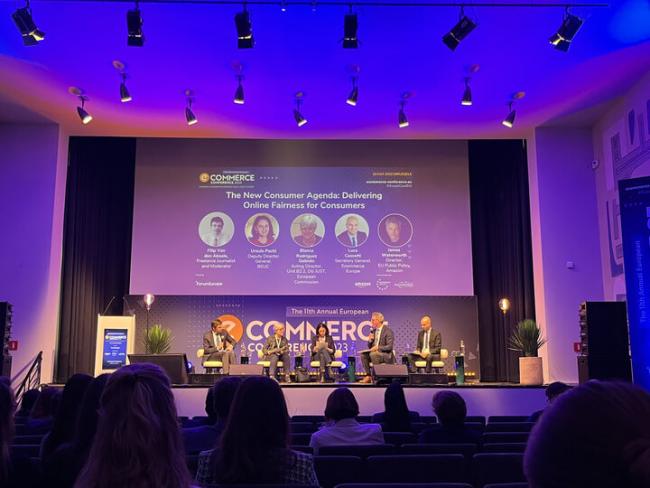
On May 23, EIBF Policy Assistant Tora Åsling and EIBF Intern Alexandra Giovagnoli attended the 11th annual conference on European e-commerce which took place in Brussels, Belgium. Continue reading for a summary of the event.
Bringing together policymakers from the European institutions and its member states as well as stakeholders in online commerce, the 11th annual European e-commerce conference discussed current issues surrounding European e-commerce regulation. A wide range of issues arising from the digital revolution were broached, including the future of the digital single market, online consumer protection through the “New Consumer Agenda”, and sustainable e-commerce.
The rise of digital technologies is constantly modernizing our societies, requiring increasingly modern, future-oriented policies. Since the Covid-19 pandemic, the European Commission has placed the digital revolution at the heart of its work. The European Commission’s Commissioner for Justice, Didier Reynders, who introduced the conference, began by highlighting the importance of consumer protection in Europe’s digital market, at a time when 90% of consumers say they have been exposed to targeted advertising which makes them feel unsafe online. As Ursula Pachl, Deputy Director General of The European Consumer Organisation (BEUC), pointed out, consumers are often vulnerable and at risk in online spaces as many tech-giants don’t comply with existing regulations on consumer protection, such as GDPR for instance. The European institutions should provide efficient support to consumers, both offline and online, she continued.
To counter this negative trend and increase consumer safety online, the European Commission has set up the "New Consumer Agenda" to give European consumers the means to play an active role in the green and digital transition. The New Consumer Agenda was launched by the European Commission at the end of 2020 and is to run for the next five years and will, for instance, involve tightening regulations on the transparency of product information provided online and better consumer protection in online commerce.
Another major issue discussed at the conference was the future of the digital single market. The Digital Single Market is a policy pursued by the European Commission to create the conditions for a digital single market within the European Union. This strategy is based on three objectives: improving access to digital goods and services throughout Europe, creating an environment conducive to the development of digital networks and services, and maximizing the growth potential of Europe's digital economy. The stakeholders agreed that regulating online commerce is crucial in order to allow European small and medium sized businesses (SMEs), like bookshops, to compete fairly in the online sphere. The existence of a digital single market would make it easier to understand the rules of a market that is constantly evolving. To harmonize the European digital market effectively, digital tools need to be put in place, notably through projects such as the "Singe Digital Gateway", to facilitate online access to information and administrative procedures for EU citizens and businesses. This platform provides an online service called "Your Europe", where businesses and individuals can be guided through the rules, rights and procedures established by EU law.
The sustainability of the digital single market is also at the heart of the contemporary challenges facing e-commerce. Pierre Hausemer, Managing Director at the Valdani Vicari & Associati group (VVA group), a public policy consultancy in Europe, spoke in particular about the survey they carried out on the environmental footprint of online commerce. Their survey revealed a significant lack of consumer understanding of online platforms, as well as the growing practice of greenwashing, which is a marketing technique designed to convey an embellished or even false image of a company's eco-responsibility. The various participants, i.e., European politicians and stakeholders in online commerce, agreed on the importance of “consumer coaching”, to create conscious consumers. To achieve this, they need to be provided with the information they need to make it easier for them to make conscious decisions and buy sustainable products.
Finally, all the stakeholders agreed on one of the central problems of the digital single market which is the failure to comply with and enforce existing legislations especially so when it comes to tech giants, but it also applies to SMEs, as some laws and their application are confusing to smaller businesses. Indeed, the participants agreed that it is now necessary to focus on the application of laws rather than bringing in more. It has been observed that non- compliance with the law is very often unintentional, due to a lack of information for SMEs. The introduction of guidelines accompanying new laws was mentioned, to enable SMES to be guided in complying to the regulations that concern them.
Overall, this conference on e-commerce in Europe allowed professionals to address fundamental issues about the future of online commerce in Europe. The stakeholders in the sector were able to discuss the challenges of the digital revolution, while at the same time coming up with potential solutions. The conference taught us that there are many challenges ahead in the field of e-commerce, particularly in terms of protecting consumers online, ensuring the sustainability of the digital single market, and improving law enforcement to help both big and small businesses, including bookshops, participate in the digital transition.
